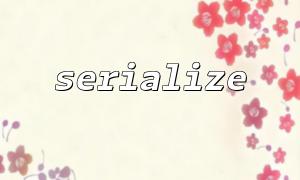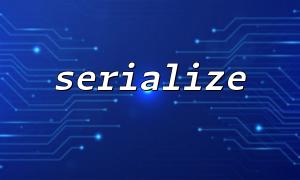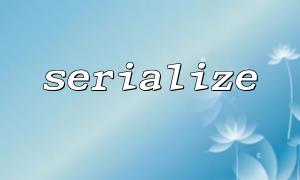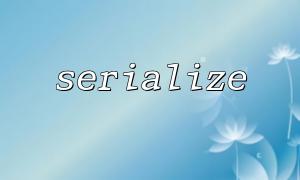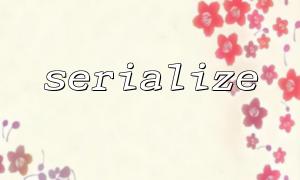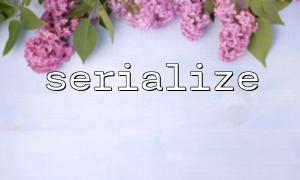In PHP development, serialize and json_encode are functions used to convert complex data structures (such as arrays, objects, etc.) into string form. Although they seem to do similar work, they differ in their internal implementation, use, and applicable scenarios. This article will compare the characteristics of these two functions and give recommendations for use in actual development to help developers make the best choices in different situations.
serialize :
serialize converts PHP variables into a string format that can be saved or transferred. It can process almost all types of PHP data, including objects, arrays, etc., and it saves the type information of the data. For example, an object will contain information such as class name, attribute, and attribute value after serialization.
$array = [1, 2, 3];
$serialized = serialize($array);
echo $serialized;
// Output:a:3:{i:0;i:1;i:1;i:2;i:2;i:3;}
json_encode :
json_encode converts PHP data structures into strings in JSON format. JSON is a lightweight data exchange format that is widely used in front-end and back-end interactions, especially with good compatibility with JavaScript. The JSON format is relatively concise compared to the serialize format and usually does not contain type information.
$array = [1, 2, 3];
$json = json_encode($array);
echo $json;
// Output:[1,2,3]
serialize :
serialize saves information about data types, so it is able to serialize PHP-specific types, such as resource types (such as file handles) and objects. However, this also means that the string format generated by serialize is only suitable for PHP environments and cannot be parsed in other languages or systems.
json_encode :
json_encode is more general and generates a standard JSON format that can be shared among different programming languages. The JSON format supports relatively limited data types, usually supporting arrays, objects, strings, numbers, and boolean values. JSON does not support resource types in PHP and does not save type information.
serialize :
The string generated by serialize is binary encoded, and although it is readable, it is not as intuitive as the JSON format. It is a format optimized for PHP environments and is not suitable for direct transmission or presentation to users.
json_encode :
JSON format strings are plain text formats, easy to understand, and can be used directly for data interactions in the Web. Because JSON exists in a standard text format, other systems and front-end applications can usually handle it directly.
serialize :
serialize is usually more efficient than json_encode when dealing with complex PHP types (such as objects, resources, etc.). However, its output format is relatively verbose.
json_encode :
json_encode is usually very good, but its output will be more concise than serialize . The performance of JSON format is also very good for data transmission that requires cross-platform or cross-language.
Data storage :
If you need to store complex data (such as objects, arrays, resources, etc.) in a database or file in PHP, and then you need to read and restore the original data structure again, using serialize is a good choice. Because serialize will retain PHP-specific data type information.
Example:
$user = new User('John', 'Doe');
$serializedUser = serialize($user);
file_put_contents('user_data.txt', $serializedUser);
PHP internal processing :
If the data is only used within the PHP environment and does not need to interact with other systems, serialize can better preserve the original data type information, especially the objects.
Cross-platform data exchange :
If your data needs to interact with front-end (JavaScript) or other programming languages, json_encode is preferred. The JSON format is widely supported, and almost all programming languages and tools can parse JSON data.
Example:
$data = ['name' => 'John', 'age' => 30];
echo json_encode($data);
// Output:{"name":"John","age":30}
Data transfer :
For data exchanges that require HTTP requests and responses (such as JSON data from the RESTful API), using json_encode is standard practice.
Enhanced readability :
If you need to present data to users (for example, view JSON data through a browser), the JSON format is more concise and clear, suitable for human reading.
| characteristic | serialize | json_encode |
|---|---|---|
| Data type support | Supports complex data types such as objects and resources | Supports simple data types such as arrays, objects, and strings |
| Data format | PHP-specific format | Standard JSON format |
| readability | Not easy to read | Easy to read, can be used for human-computer interaction |
| Cross-platform support | Applicable to PHP only | Widely supported, including JavaScript |
| Use scenarios | PHP internal storage and processing | Cross-platform data exchange, web development |
In actual development, choosing to use serialize or json_encode mainly depends on your needs. If it is to store PHP internal data or process complex types (such as objects), use serialize ; if cross-platform data exchange (such as front-end communication), use json_encode .
